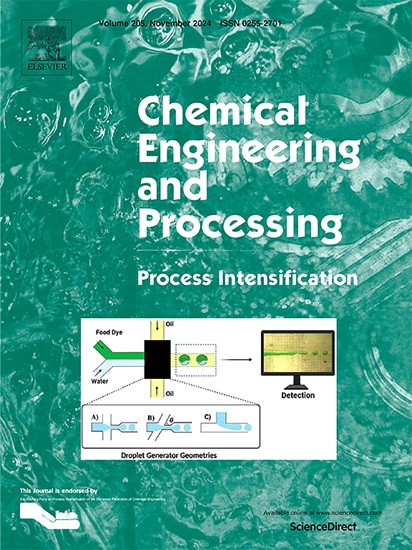Study on hydrogen production by microwave-assisted steam gasification of Eupatorium adenophorum
IF 3.9
3区 工程技术
Q3 ENERGY & FUELS
Chemical Engineering and Processing - Process Intensification
Pub Date : 2025-05-05
DOI:10.1016/j.cep.2025.110354
引用次数: 0
Abstract
Biomass has become one of the important raw materials for hydrogen production technology, which is realized by gasification and pyrolysis. Eupatorium adenophorum has 78.69 % volatile and 6.51 % hydrogen, which is a good material for producing hydrogen-rich gas. In this paper, hydrogen-rich gas production by microwave gasification of Eupatorium adenophorum is investigated. Under the optimized conditions of gasification temperature of 800 °C, gasification time of 40 min, and steam flow rate of 0.5 g / min, a solid yield of 2.38%, a liquid yield of 41.77%, and a gas yield of 55.87% were obtained. The product yields and contents were compared between the different methods. The hydrogen content of the gas product from microwave pyrolysis gasification was 47.62%, which was more than four times higher than that of the conventional pyrolysis method for hydrogen production and 30% higher than that of the conventional gasification method for hydrogen production. The calorific value of the gas mixture obtained from microwave pyrolysis gasification reaches 11.31 MJ/Nm3, which is higher than the calorific value of industrially produced water gas, and can be used as a gas fuel.. The microwave-assisted gasification technology provides a new idea for the transformation and utilization of Eupatorium adenophorum.

紫茎泽兰微波辅助蒸汽气化制氢研究
生物质已成为制氢技术的重要原料之一,通过气化和热解实现制氢。紫茎泽兰挥发物含量为78.69%,氢气含量为6.51%,是生产富氢气体的良好原料。对紫茎泽兰的微波气化产氢进行了研究。在气化温度为800℃,气化时间为40 min,蒸汽流量为0.5 g / min的优化条件下,固体收率为2.38%,液体收率为41.77%,气体收率为55.87%。比较了不同方法的产物得率和含量。微波热解制氢气产物氢含量为47.62%,比常规热解制氢法高4倍以上,比常规气化制氢法高30%。微波热解气化所得混合气的热值达到11.31 MJ/Nm3,高于工业产水煤气的热值,可作为燃气燃料使用。微波辅助气化技术为紫茎泽兰的转化利用提供了新的思路。
本文章由计算机程序翻译,如有差异,请以英文原文为准。
求助全文
约1分钟内获得全文
求助全文
来源期刊
CiteScore
7.80
自引率
9.30%
发文量
408
审稿时长
49 days
期刊介绍:
Chemical Engineering and Processing: Process Intensification is intended for practicing researchers in industry and academia, working in the field of Process Engineering and related to the subject of Process Intensification.Articles published in the Journal demonstrate how novel discoveries, developments and theories in the field of Process Engineering and in particular Process Intensification may be used for analysis and design of innovative equipment and processing methods with substantially improved sustainability, efficiency and environmental performance.

 求助内容:
求助内容: 应助结果提醒方式:
应助结果提醒方式:


